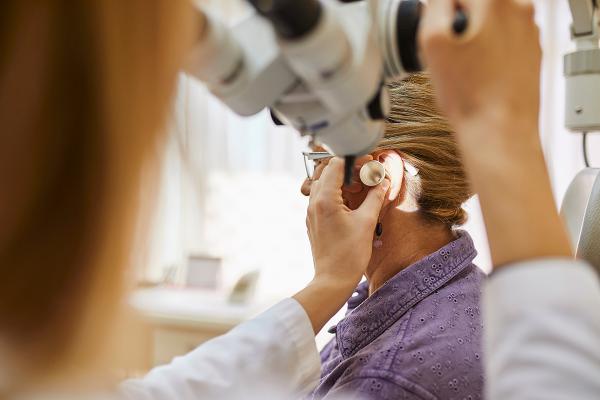
AARP Hearing Solutions helps members access hearing care professionals, no-cost hearing exams and more.
Get the inside scoop from hearing expert Monica Murray, Au.D., of UnitedHealthcare Hearing.

Many people start to notice hearing problems as they get older. And wearing hearing aids could make a big difference. Whether you’re new to the world of hearing aids or you’ve been wearing these devices for a while now, it’s normal to have some questions. In this series, an expert audiologist at UnitedHealthcare Hearing gives helpful advice about common concerns.
I’m about to get hearing aids for the first time, and I know I’ll be self-conscious about wearing them. How can I feel more comfortable in public?
It’s normal to feel a bit self-conscious when you first wear hearing aids. If you’re worried about it, I recommend that you ease into your new devices.
Start small. Start by wearing your hearing aids at home. It’s a quiet environment where you feel comfortable, so it’s a good place to test them out. Practice taking your devices in and out. Get used to how they feel in your ears.
Wearing them just around your immediate family at first should also help you feel less nervous. You’ll get used to having people see you with hearing aids, and your loved ones will get used to seeing you wear them. This can boost your self-confidence.
Go public. Once you feel good about wearing them at home, then try them out in public. If you’re still feeling apprehensive, take baby steps. Maybe you wear them to the grocery store one day, for example. Or you pop them in when you meet friends for lunch.
And remind yourself that other people may not even notice your hearing aids. Today’s behind-the-ear devices are great because they have a thin tube and wire that make them essentially invisible.

AARP Hearing Solutions helps members access hearing care professionals, no-cost hearing exams and more.
Consider a device that blends in. When you choose your hearing aids, talk to your hearing care professional about your concerns. They can help you find a discreet option. And know that devices are a lot more cosmetically appealing these days. You can actually get hearing aids in different shades that match your hair color or skin tone:
All prescription hearing aids come with a trial period. So if you find that a style isn’t right once you begin wearing them, you could try a different model.
Change your mindset. You might not realize that wearing your hearing aids could inspire people around you. These devices can make a real difference, and it’s brave to wear them. Some people may want to ask you questions about your hearing aids because they’re thinking about getting them soon.
So you might find yourself becoming a role model and trusted adviser for others.
Finally, I want to reassure you that as time goes on, most people get used to their hearing aid and appreciate how much better they can hear. After a while, you’ll probably forget that you ever worried about wearing them.
(If you’re a member of AARP®, you get multiple follow-up appointments and a trial period to try out your new prescription hearing aids at no extra cost. Learn more.)
Meet the expert
Monica Murray, Au.D., is vice president of program development at UnitedHealthcare Hearing and a nationally recognized hearing health expert.
Information is for educational purposes only and is not a substitute for the advice of a licensed medical provider. Consult your provider prior to making changes to your lifestyle or health care routine.
AARP Hearing Solutions is available to all AARP members and does not require a health insurance plan from UnitedHealthcare. The AARP hearing program discount cannot be combined with any other discounts, promotions, coupons or hearing aid benefit plans unless noted herein. Products or services that are reimbursable by federal programs including Medicare and Medicaid are not available on a discounted or complimentary basis. AARP commercial member benefits are provided by third parties, not by AARP or its affiliates. Providers pay a royalty fee to AARP for the use of its intellectual property. These fees are used for the general purposes of AARP. Some provider offers are subject to change and may have restrictions. Please contact the provider directly for details. UnitedHealthcare Hearing is provided through UnitedHealthcare, offered to existing members of certain products underwritten or provided by UnitedHealthcare Insurance Company or its affiliates to provide specific hearing aid discounts. This is not an insurance nor managed care product, and fees or charges for services in excess of those defined in program materials are the member's responsibility. UnitedHealthcare does not endorse nor guarantee hearing aid products/services available through the hearing program. This program may not be available in all states or for all group sizes. Components subject to change.
Hearing aids purchased in the Silver technology level will receive 1 follow-up visit.